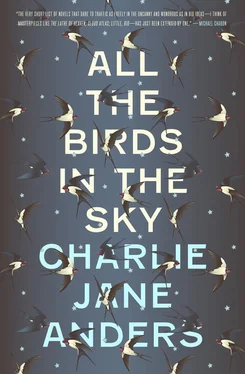They were sitting on the carpet of the main office on the top floor. The chicken was perfectly crispy and gushed with juice inside its bread shell, and Laurence’s fingers still felt pristine after two pieces. The bucket had the name of some local fry shop on it. How did Milton keep conjuring up fast food? Even for a billionaire, this was a coup. Laurence sensed Milton was making some late-in-the-game effort to bond. They were listening to Robert Johnson, the only music Milton liked.
“The two-second time machine.” Laurence wiped his fingers even though there was no need. “Classic example of a useless device.”
“Well, yes and no.” Dirth shrugged with his whole torso. “It was a badge of membership in a select group, right? But also, an object lesson. Imagine if you could build a device that goes backward two seconds, instead of forward two seconds. But you couldn’t stop yourself from pressing it over and over.”
“You’d be stuck in a loop,” Laurence said. “The same two seconds, forever.”
From where Laurence sat on the floor he could just see the treetops of the forest on the other side of the feeder road from the industrial park. They shook like pom-poms.
“We could be stuck in a two-second time loop right now, and never know it,” said Dirth. “Except that it’s already been two seconds since I said that. But yeah, think about it, man. The same device, harmless if you go one direction, but potentially disastrous if you go the other way. Sometimes things have a grain, that you have to go with. You can’t swim against a tidal wave.”
“And history,” said Laurence, maybe seeing where Milton was going with all this. “History is a tidal wave.”
Laurence glanced out the window again, and this time he could see not just the tops of those trees, but the branches and some of the trunks. They were waving at him. He thought maybe if he did a good job of bonding with Milton, he would let Laurence out to take a walk in the woods. It would make Laurence feel closer to Patricia.
“History is just the flow of time writ large, man,” Milton said.
Laurence reached for another piece of chicken, then glanced up to see the trees from across the road. He could see way more of their trunks now.
“Get down!” Laurence threw himself on top of Milton on the floor, just as a branch, as wide as his rib cage, shot through the window and into the far wall. In seconds the room was crammed with leaves and branches. Laurence couldn’t see the walls or any of the desks, just dense, heavy, spiky green.
Laurence crawled on his belly toward the open doorway. From behind him, Milton said, “What the hell is…,” and Laurence just shrugged, since he couldn’t say anything without losing his voice forever. He had enough presence of mind to bite his tongue.
From downstairs, Laurence heard the firecracker laugh of a machine gun. Someone screamed in pain and fear. The guards were shouting for backup, and more and bigger weapons.
Laurence reached the door that led from the main office and got to his feet. He had fried chicken skin stuck to his knee. He ran to the other side of the building, where there was still clear space and he could see out the window. Standing in the disabled parking spot was Patricia’s friend Dorothea, wearing a floor-length floral skirt and Birkenstocks. He could just hear her chatting about a grandmother who left one of her grandchildren at the seaside, another at the edge of the desert, and a third at the foot of the mountains, and the grandmother couldn’t remember which child she had left where. Laurence guessed that Ernesto, the guy whose touch supercharged anything organic, was somewhere in the middle of the assault of trees.
“Mr. Dirth. Sir.” A couple of guys in all-black outfits, with big guns slung over one shoulder, came running into the big office. “There’s been some kind of attack. We need to get you out of here.”
“Screw me,” Dirth said. “Protect the machine. That’s what they’re here for.”
Laurence was still staring down at Dorothea. A man sprinted toward Dorothea, shooting his semiautomatic to no effect. When the man reached Dorothea, his head separated from his neck, as if she had a razor-sharp whip. The man fell one way, his head rolled the other. Laurence looked down at the dead body and hesitated one second longer. Then he turned toward Milton.
“You’re going to want a white noise machine,” Laurence said. “Something so she can’t hear herself speak.” Laurence waited to be struck dumb, but apparently he hadn’t broken his promise.
“What do you—” the man with the gun said.
“The fabrication machine,” Milton said. “It’s near where she is. Turn on the goddamn fabricator.”
Laurence took off running. He ignored Milton yelling after him and the men with the guns shouting for him to stop. Once in the stairwell, he took the stairs three at a time. He made for the bright exit, shouting, “Patricia!”
Dorothea recognized Laurence as he came out into the parking lot. She nodded at him, but didn’t stop talking about the grandmother and the lost children. Laurence waved at her and kept running, around the side of the building. Around Dorothea’s feet lay the headless bodies of four men.
The fabricator turned on just as Laurence was ten yards away, near the tiny window to his own lab. It was a deafening clatter, and for the first time Dorothea looked flustered. She kept trying to talk, but she stumbled over a word. And then another.
Laurence didn’t hear the gunshot over the noise of the fabricator, but he saw the back of Dorothea’s head go out. She fell, so she was almost touching the bodies of her own kills.
Nobody thought to turn off the fabrication machine, so the air was still filled with churn. Laurence stared at the dead body in the long flowy skirt for a moment, remembering when he’d eaten tacos with her. Then he thought about the fact that Patricia had to be here someplace, and took off running again.
Patricia was rising off the ground. Laurence had thought she couldn’t fly, but there she was. She floated on the wind, like a balloon that some kid had lost hold of at the fairground. Patricia was so close to Laurence, closer than she’d been in months, but he had no way to get to her. He called out, but she couldn’t hear him over the white noise. He screamed her name until his voice was shot.
Patricia looked peaceful, her arms spread a little, like a snow angel. Her feet pointed down. She wore no shoes. Her socks had pom-poms over the heels. Her shadow fell right over Laurence’s eyes, and her path converged with the gantry that had the precious wormhole machine on it. He tried to get her attention, but she was too far away now. By the time Patricia reached the top, she was a dot. But what happened next was easy to see from the ground: Lightning poured out of the sky, from a cloud that hadn’t been there a moment earlier. Slash after slash, until smoke floated down. The light blinded him, but he couldn’t look away, and he screamed Patricia’s name with his hoarse, smoke-singed throat. Laurence could barely stand because he felt like his center of gravity was being crushed by seeing her dear shadow against the hideous white glare. Cinders and twisted pieces of the wormhole machine rained down and nearly hit Laurence’s hot wet face.
EVERYBODY WAS SINGING madrigals. Tight staggered harmonies that rang with a lightness that had sharp pieces of melancholy embedded in it. Quartets, quintets, and bigger groups went door-to-door in residential areas or barged into bare-bones eateries, holding sheet music and wearing modest black linen-cotton outfits. A pitch pipe sounding a single note was your only warning that your heart was about to be wrecked. “Now Is the Month of Maying,” “O Morte,” even crazy Carlo Gesualdo. People would stop whatever they were doing and listen to madrigals, until they were tear-soaked. Something about the way the trebles and altos would introduce a soaring melodic line, and then the tenors or basses would come in to fuck it up, was like the musical knife-twist you never saw coming. After the flood, everyone agreed that madrigals were the soundtrack of our lives.
Читать дальше












